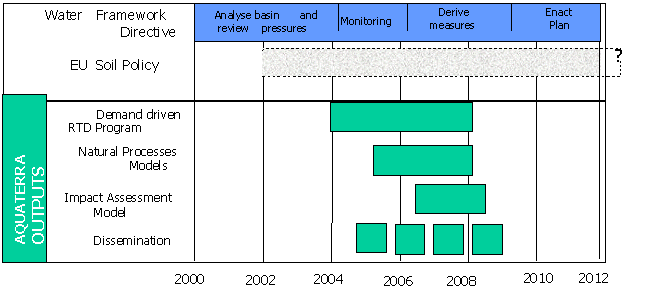"Integrated modelling of the river-sediment-soil-groundwater system; advanced tools for the management of catchment areas and river basins in the context of global change"
Changes in climatic conditions, land use practices and soil and sediment
pollution have large scale adverse impacts on water quantity and quality. The
current knowledge base in river basin management is not adequate to deal with
these impacts. AquaTerra is both integrating and developing knowledge to resolve
this and disseminating it to stakeholders.
In the water cycle, soil is a key element affecting groundwater recharge and the
chemical composition of both subsurface and surface waters (the latter is
additionally affected by sediments). The proper functioning of the
river-sediment-soil-groundwater system is linked to key biogeochemical processes
determining the filter, buffer and transformation capacity of soils and
sediments. AquaTerra aims at a better understanding of the system as a whole by
identifying relevant processes, quantifying the associated parameters and
developing numerical models of the groundwater-soil-sediment-river system to
identify adverse trends in soil functioning, water quantity and quality. The
modelling addresses all relevant scales starting from micro-scale water/solid
interactions, the transport of dissolved species, pollutants as well as
suspended matter in soil and groundwater systems at the catchment scale, and
finally the regional scale, with case studies located in major river basins in
Europe. With this integrated modelling system, AquaTerra provides the basis for
improved river basin management, enhanced soil and groundwater monitoring
programs and the early identification and forecasting of impacts on water
quantity and quality during this century.
AquaTerra is committed to the dissemination and exploitation of project results
through structured workshops, dedicated short courses, and the active
participation of consortium partners in national and international conferences.
The quality and direction of the project is supervised by a peer review panel,
which will routinely assess project progress from a scientific and stakeholder
perspective. Results from AquaTerra will be fed into ongoing discussions on the
implementation of strategies for future water and soil policies in Europe (water
framework directive, groundwater directive, thematic strategy on soil
protection, etc.).

AquaTerra is split into the 10 sub-projects shown above. Newcastle University is leading the HYDRO sub-project.
HYDRO aims at an improved understanding of the mechanisms and impact of global change and in particular climate change on the water cycle, providing the driving data for an assessment (through the other sub-projects) of the impact on water quality and availability, as well as soil functions. This affords an ideal opportunity to bring together innovative methods in generating climate and rainfall scenarios to drive an integrated surface-subsurface model. This synergy has not previously been realised and will provide much needed understanding of the role of precipitation variability on the key biogeochemical processes in soils and sediments (FLUXES, BIOGEOCHEM), how these influence water quality and quantity (COMPUTE) and how these relationships may change under perturbations of climate and land-use (TREND).
Five river basins in Europe are being investigated:

It is hoped that outputs from the project will inform both EU Soil Policy and the new Groundwater Directive.

